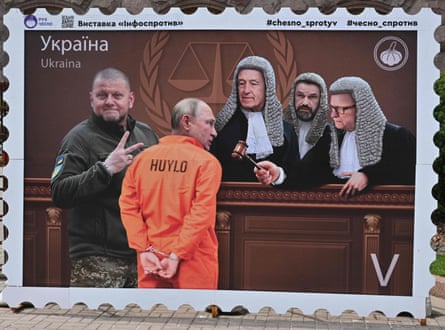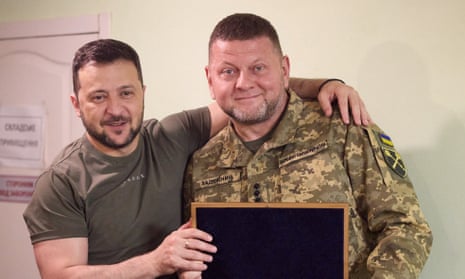For a president in wartime, the only political threat greater than a popular general could well be a popular general who has been unceremoniously fired.
That appears to be a risk Ukraine’s president, Volodymyr Zelenskiy, is ready to take, having failed to persuade Gen Valerii Zaluzhnyi to resign as commander in chief of the Ukrainian armed forces. While some Ukrainian politicians urged a reconciliation between the two men and said that was still possible, rumours of the general’s imminent dismissal continued to circulate in Kyiv on Wednesday.
While Zelenskiy is undisputedly the face of Ukraine abroad, Zaluzhnyi rivals the president’s popularity at home. His square bulldog features are on countless posters and internet memes across Ukraine including one showing him manhandling Vladimir Putin before an international court in The Hague. It is that rival popularity that is at the heart of the current crisis, opposition MP and Zaluzhnyi ally Oleksii Goncharenko said.
“It’s about the personal relationships between them. I don’t think it’s about the conduct of the war,” Goncharenko said. “Zelenskiy has been, don’t forget, an actor, and like he wants to be the only star in the show. And they are both emotionally exhausted after the past two years.”

Zelenskiy made Zaluzhnyi head of Ukraine’s armed forces in July 2021, when the country had already been fighting to defend its eastern provinces from Russian encroachment for seven years, but Putin was beginning to assemble a far greater invasion force across the border.
Once in his post, Zaluzhnyi had seven months to prepare for the onslaught and surprised the world by defending Kyiv, smashing the bulk of the Russian invading force as it got blocked on the way to the capital, and then fighting back to recapture more than half of the lost territory.
A much-heralded counteroffensive to take back more ground last summer failed to make the progress Kyiv and its backers had hoped for, and Zaluzhnyi admitted to the Economist that the war was at a stalemate and that without a vast technological leap there would “most likely be no deep and beautiful breakthrough”.
The interview irritated the president’s office but did not seem to have dented Zaluzhnyi’s standing among ordinary Ukrainians, according to opinion polls. On that score, he is consistently the only public figure to rival Zelenskiy.
The 50-year-old general is seen as the embodiment of Ukraine’s military transformation from Soviet-era top-down stolidity to western-style modernity, a system in which junior officers are trusted to make the right decisions in the heat of battle rather than wait on orders from above.

Zaluzhnyi was literally born into the old system, arriving into the world in 1973 in a Soviet military garrison in northern Ukraine where his father was serving. Growing up, however, his instinct was to shrug off the military legacy and one early ambition was to become a comedian, the same profession from which Zelenskiy emerged. But family tradition won out and Zaluzhnyi graduated with honours from the Odesa Institute of Land Forces in 1997.
He was too young to have been thoroughly schooled in the Soviet culture of command, which revolves around unquestioning obedience up the chain. For his master’s thesis, Zaluzhnyi wrote an analysis of US military structure.
As he rose through the ranks, at an accelerated rate after Putin’s seizure of Crimea and offensive in the eastern provinces in 2014, Zaluzhnyi has preserved a sense of informality and bonhomie with his troops, in stark contrast to older officers, often being photographed in T-shirts and shorts. He was drinking a beer at his wife’s birthday when the call came from Zelenskiy in summer 2021 asking him to take overall command of the armed forces. His first response, he later told Time magazine, was: “What do you mean?”
He said he felt as if he had been punched “not just below the belt but straight into a knockout”.
In public, Zaluzhnyi has maintained that same air of modesty and lack of ambition, insisting on the complete separation of military affairs and politics, but the president’s office has not been convinced. Zelenskiy’s aides suspect that the general’s charitable foundation could ultimately become a political platform, and viewed an increasing number of social media posts of Zaluzhnyi with his wife as projecting a would-be presidential vibe.

Nothing would do more to push the general into the ranks of the opposition than dismissal. He is clearly unwilling to go, refusing to resign and standing firm in the face of an orchestrated campaign of rumours that he is on the way out.
It is not clear why Zelenskiy is willing to run the risk of alienating such a popular potential rival. If there are differences over tactics and strategy, they have not been made public. But whatever the source of the split, its evident seriousness and the way it has been handled have shone a light on Kyiv’s frailties.
“As the war in Ukraine reaches the end of its second year, not a trace remains of the former unity among the Ukrainian elite,” says Konstantin Skorkin, a political analyst writing for the Carnegie Endowment for International Peace. “The longer the fighting drags on, the more tempting it is to look for someone to blame, and the more real the threat of internal destabilisation.”
“I am afraid that if Zaluzhnyi is sacked, that will hurt the morale of the society. That that is the problem,” Goncharenko said. “I don’t think it will directly influence the battlefield, but I think it is the influence on morale in society which is the real problem.”
